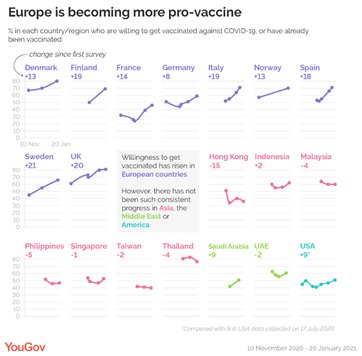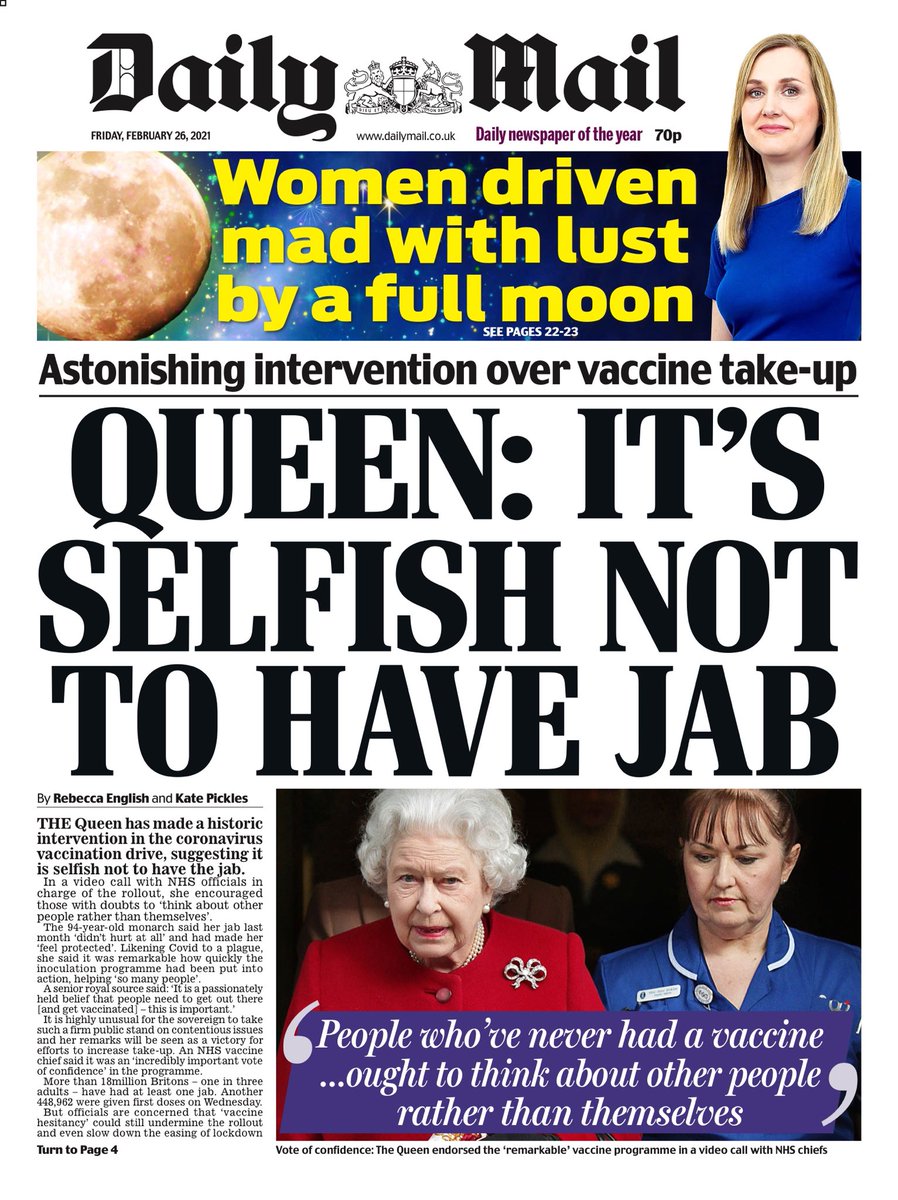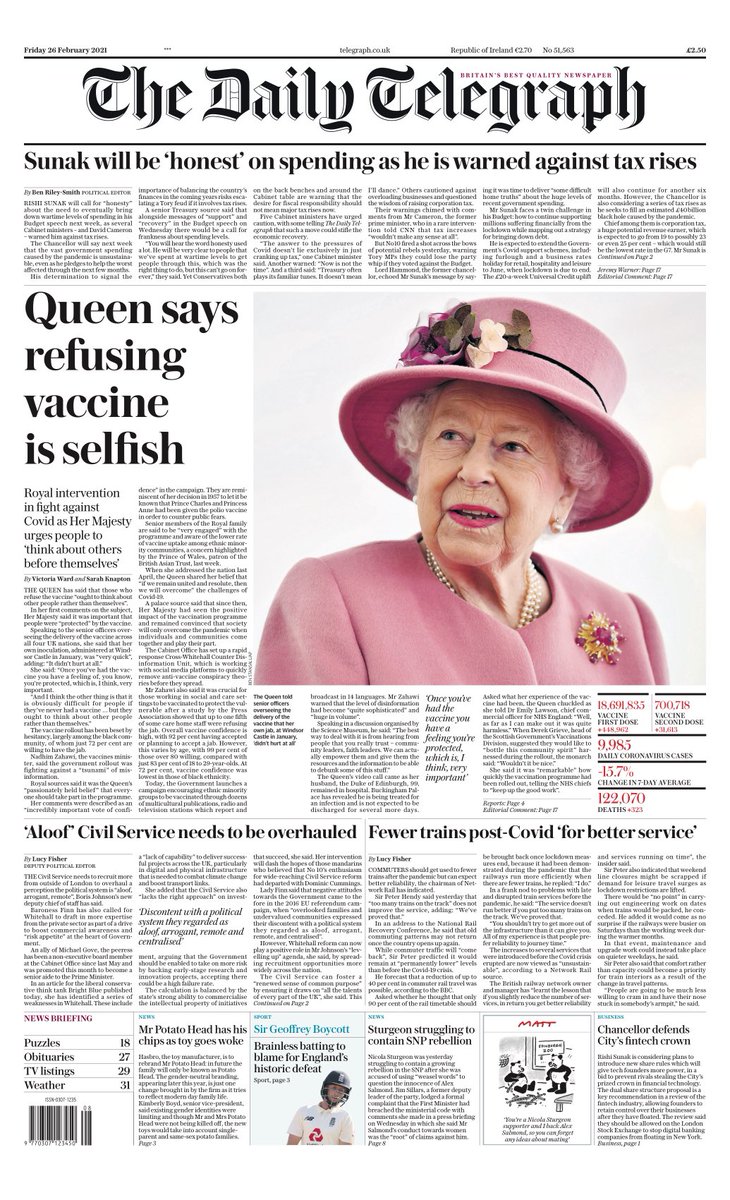
New report from @rakibehsan has an ICM poll boost of 558 Black British respondents, and a general poll of 1000 people. As the author notes, 3% Black British population under-surveyed, a minority among the under-surveyed ethnic minority groups
https://twitter.com/HJS_Org/status/1364564857459269634
On its headline question - is Black Lives Matter a voice for Black Britons - ICM data says, on balance, Yes. Personal views differ, but by a 4-1 margin (59% positive, 14% negative) Black British respondents saw the 2020 BLM anti-racism protests as + for race relations in the UK 
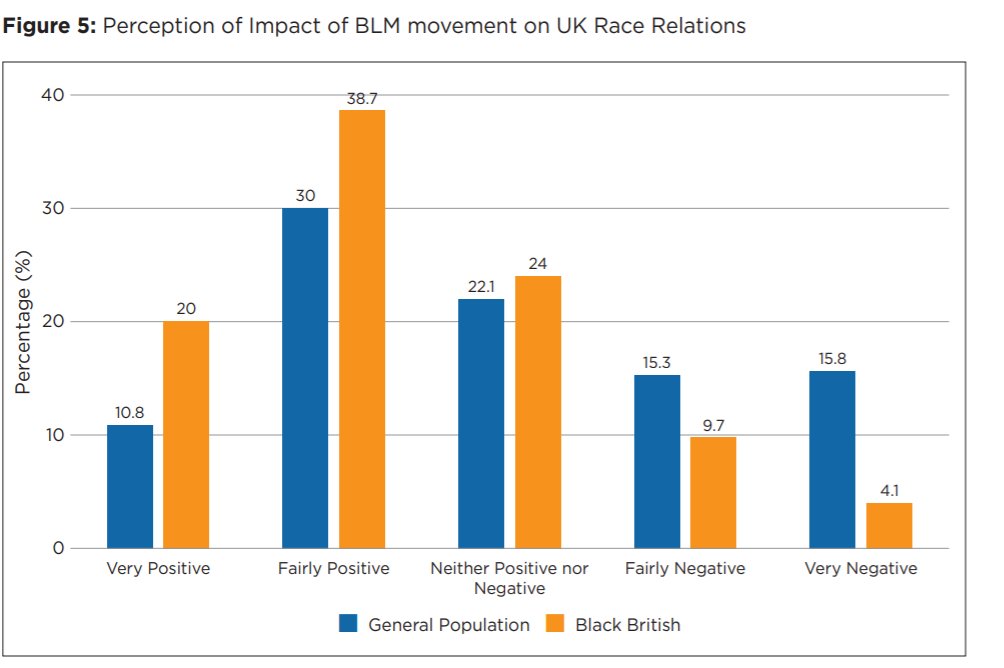
The report also shows a plurality of the general population saw the Black Lives Matter protests as net positive (across nations/regions), though much more decisively in London. This mixed but net positive picture is in line with most (but not all) other survey findings. 
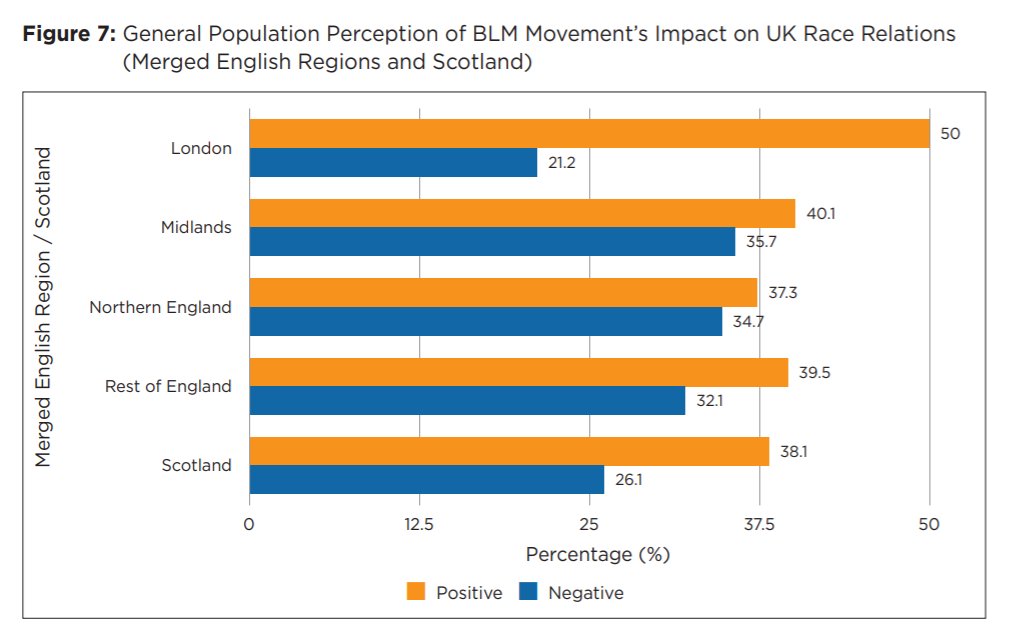
The value of looking specifically at Black British opinion, not just ethnic minority opinion, is captured by these sobering findings on institutional fairness. NHS is net trusted to be fair; on the fence on local govt. Stark police findings; education perhaps more striking still 
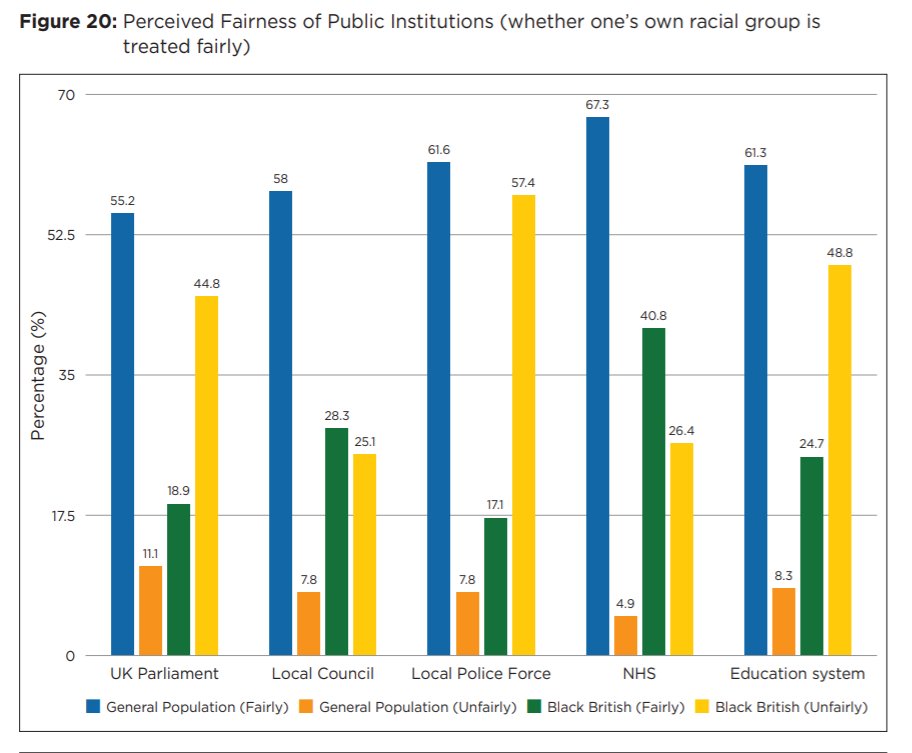
If "Black Lives Matter" resonated with most Black British respondents, what does this mean?
Not Anti-Capitalism (1/4 support; not stridently pro-capitalism (1/4) either)
Definitely not "Defund the Police" (1/5 support; most oppose)
But Reparations post-Empire backed 60-12
Not Anti-Capitalism (1/4 support; not stridently pro-capitalism (1/4) either)
Definitely not "Defund the Police" (1/5 support; most oppose)
But Reparations post-Empire backed 60-12
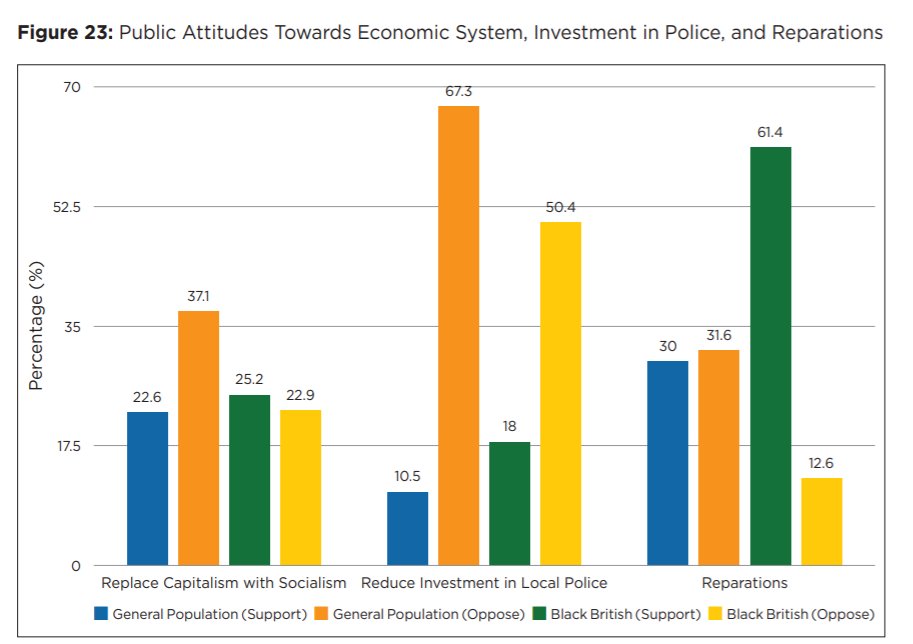
I've also found a broad cross-ethnic consensus that Britain isn't America on Race. (Our challenges aren't identical). *But* most Black British people want to challenge how this can be used to say America is racist but Britain isn't. Again,sobering gap in inter-ethnic perspectives 
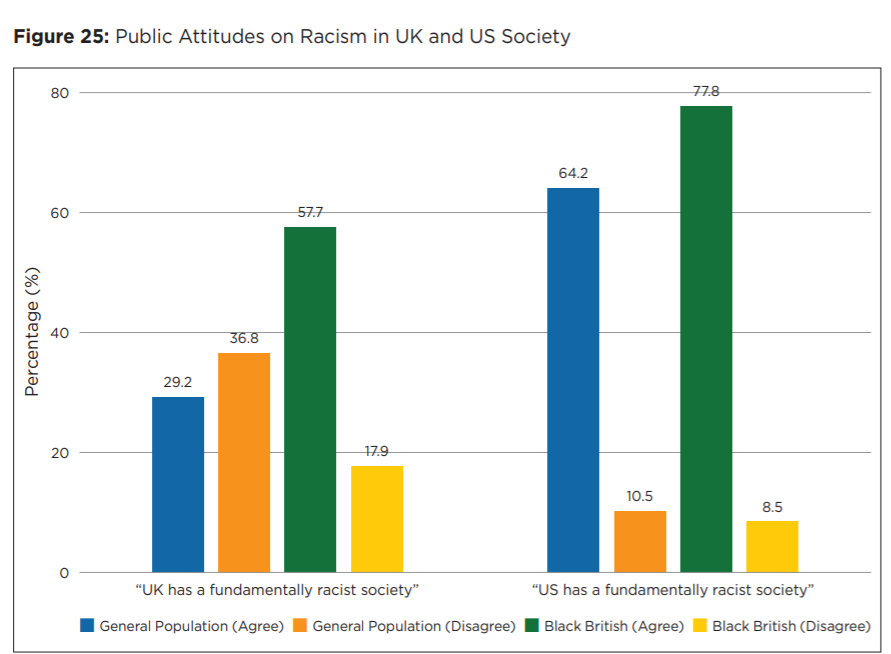
On policing specifically, a similar pattern: there is a broad cross-ethnic consensus that America has a deep problem - & the British situation differs. But there is a very significant difference of perceptions about whether there is a problem in Britain and how serious this is. 
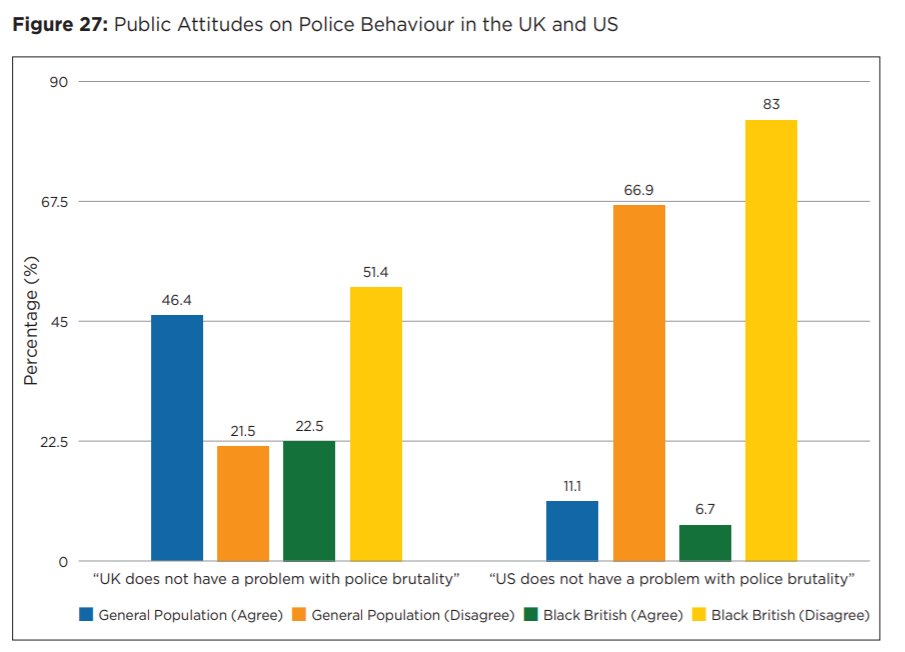
The Black group is itself internally diverse, by age, education, geography. Here is a snapshot of Black African and Black Caribbean views of racism in Britain. "Tend to agree" there is a foundational and systemic issue - though a full range of different views are held, of course 

Most Black British people value their British identity - at same time that most think Britain has big issues with racism.
You can be patriotic about a society that you believe needs to significantly change: poll shows that remains a Black British norm in 2020 (as it was in 1948)
You can be patriotic about a society that you believe needs to significantly change: poll shows that remains a Black British norm in 2020 (as it was in 1948)
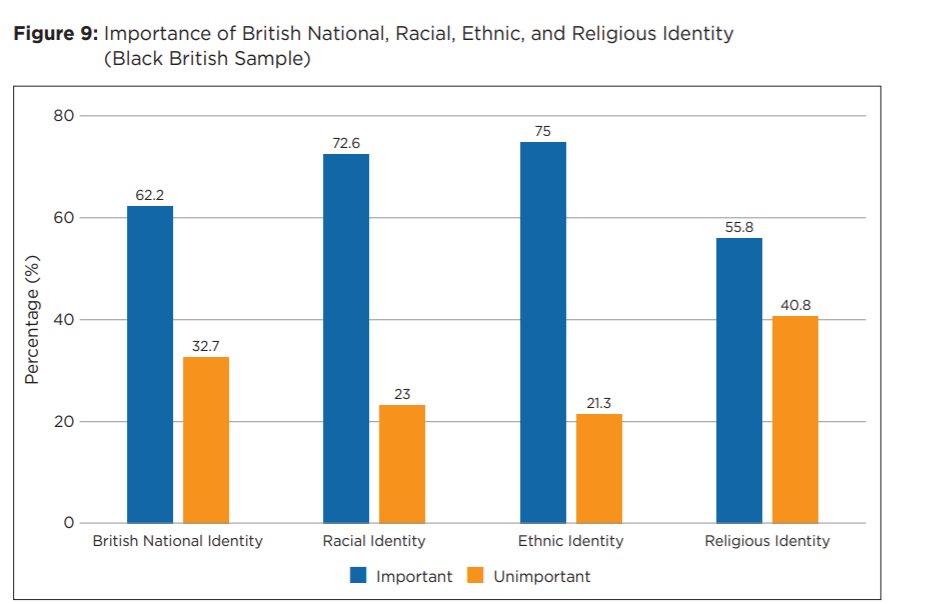
Overt racial prejudice is not popular.
7-9% of people tick the box saying "unfavourable" view of Black people, Indians; 13-14% do so for Pakistanis and East Europeans.
Up to half (40-50%) say actively favourable about minorities. Neither also a popular answer about a group
7-9% of people tick the box saying "unfavourable" view of Black people, Indians; 13-14% do so for Pakistanis and East Europeans.
Up to half (40-50%) say actively favourable about minorities. Neither also a popular answer about a group
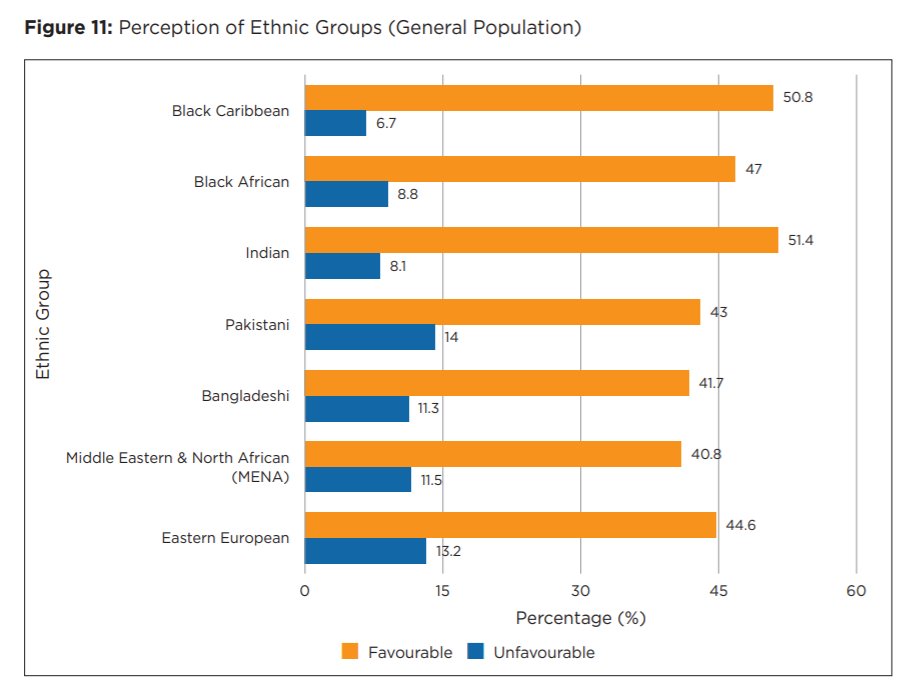
Understudied feature of UK race relations is the reciprocity of inter-ethnic norms.
8% of Black people say they don't like white people. 6/10 say favourable. & Neither popular too
Black views of Asian & white minorities similar to general perceptions: prejudiced 1/10 to 1/6
8% of Black people say they don't like white people. 6/10 say favourable. & Neither popular too
Black views of Asian & white minorities similar to general perceptions: prejudiced 1/10 to 1/6
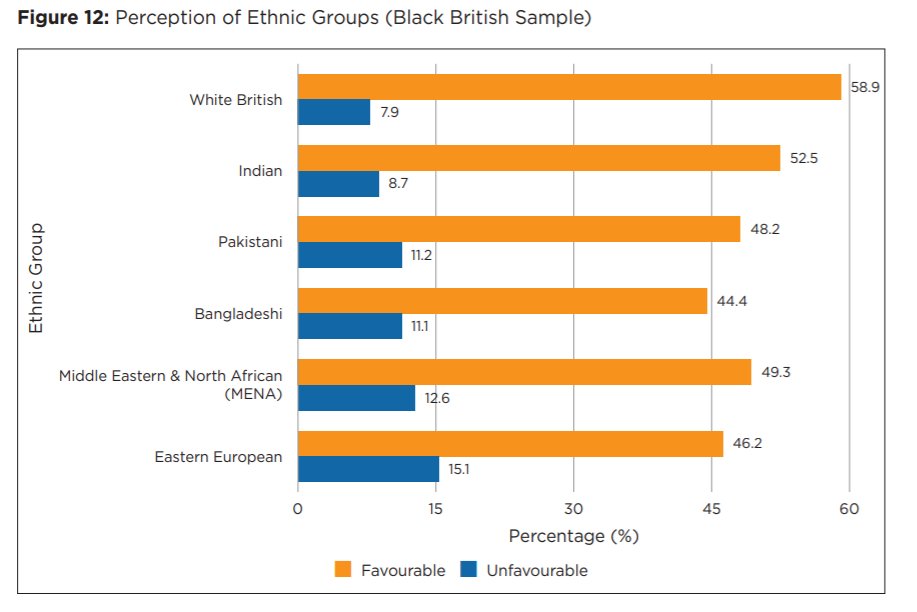
If want to understand big inter-generational drop in racial prejudice in Britain, this vg @ProfSobolewska paper highlights *reciprocal* drop in social distance. (Helps explain why contact matters + our inter-generational gap on race norms too)
https://twitter.com/sundersays/status/1284098606648242176
Views of faith groups (general): anti-Muslim prejudice is broadest. I have an unfavourable view of Muslims as a group is something 1/5 people are willing to tick on the screen 
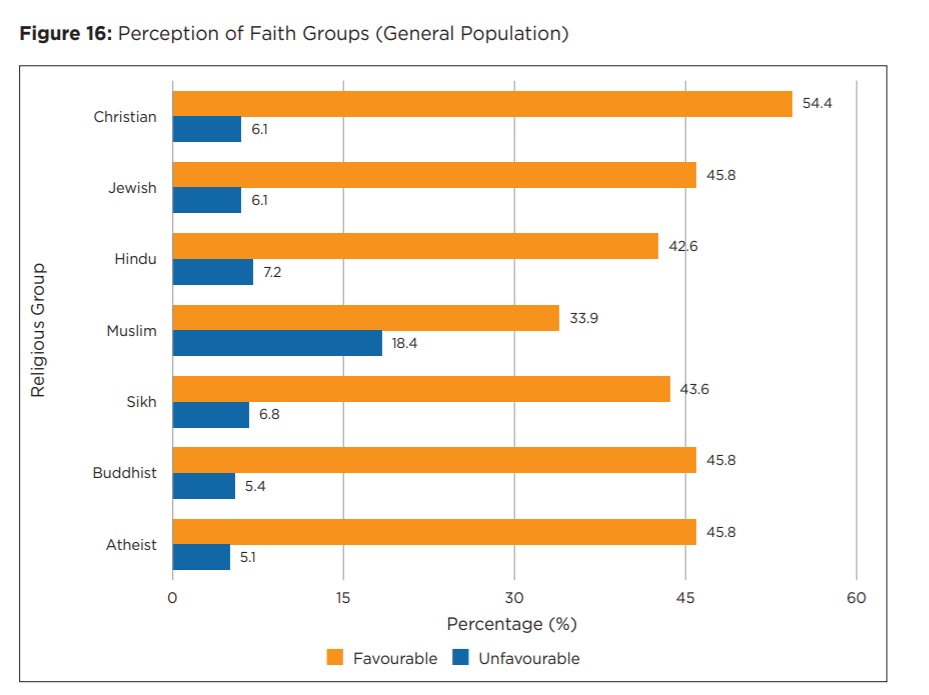
Black British perceptions of faith minorities are broadly in line with the general population. Mildly warmer towards Muslims; twice as down on atheists, but that is at the margin (10% v 5%); a bit more pro-faith overall, so more pro-Christian. 
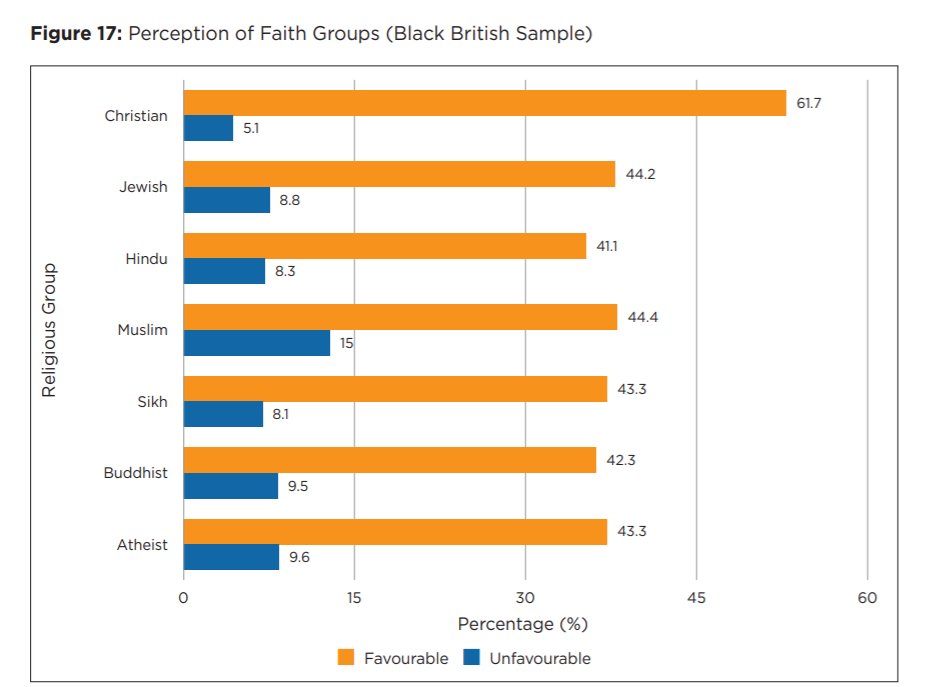
But, asked about anti-Jewish and anti-semitic tropes, there is a larger minority of Black British respondents who are open to them - up to 1/6 people (compared to 1/10). (This pattern resembles authoritative @CST_UK studies on the reach and distribution of anti-semitic tropes) 
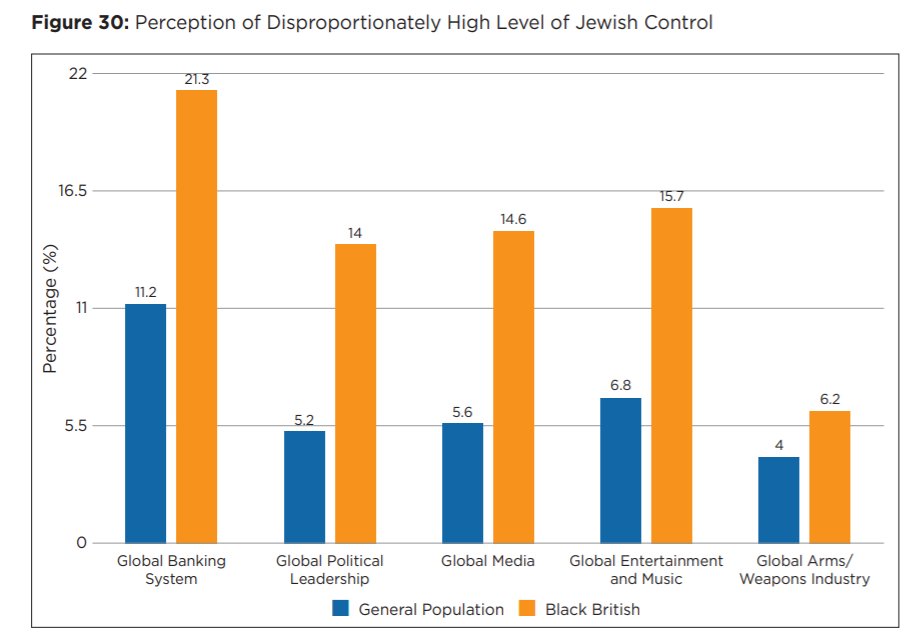
Innovative question. Which countries do people like? Black British views similar - except for being more pro-Nigeria (+14) rather than sceptical of Nigeria (-8), and more pro-Jamaica (+44 vs +27). Israel & Palestine 1/4 for and 1/4 against: fence-sitting among general public 

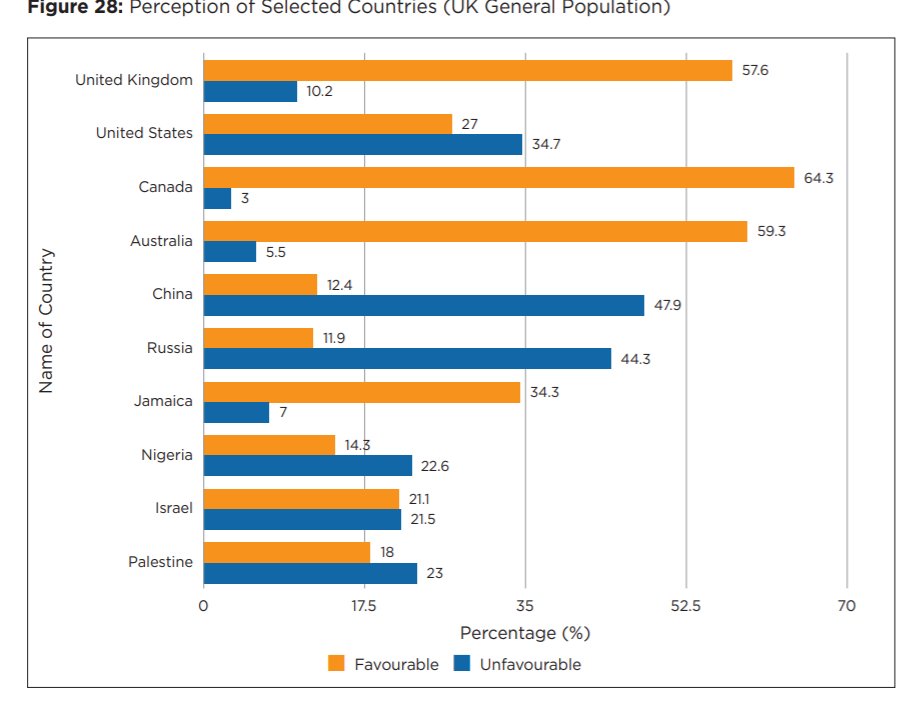
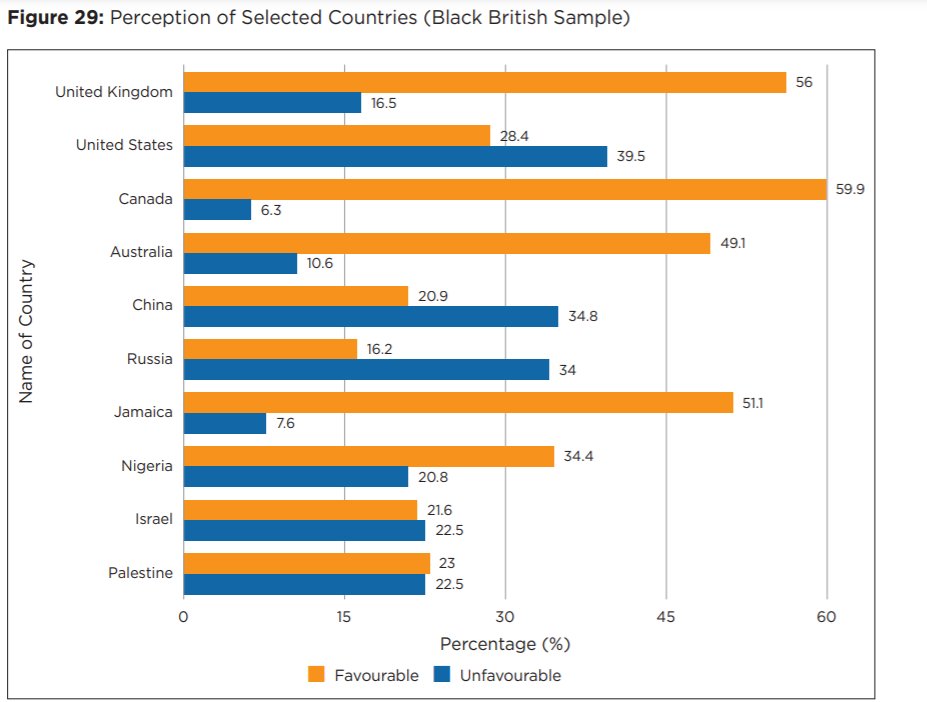
(Somebody should ask that Q again with EU as an option + India, Pakistan + some of Belgium, France, Germany, Italy, Poland, Spain). Idea for @anandMenon1 @ProfTimBale @MattSingh_
(The Black British findings suggest some Commonwealth focus is obvs not just a white British thing)
(The Black British findings suggest some Commonwealth focus is obvs not just a white British thing)
Important finding here: more dissatisfaction among the British-born Black British than those born abroad. More dissatisfaction among the younger adults. 
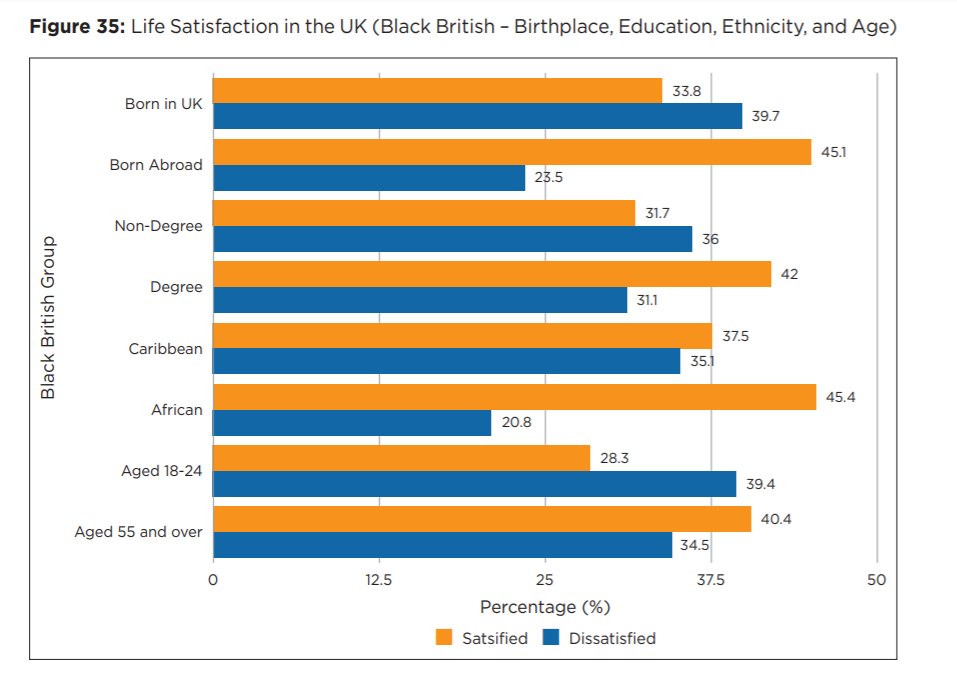
Support there for Katwala's generational paradox of progress on race: the higher and rising unmet expectations of those with a birth-right claim to equal opportunities in Britain, who are not content to just face less prejudice than previous generations
conservativehome.com/platform/2020/…
conservativehome.com/platform/2020/…
Black British people do rather massively prefer democratic protest, within the law, to violent protest. If you did need a poll finding to discover this fact, here is confirmation of this fact. (It may be news to some Very Online people with low levels of inter-ethnic contact) 
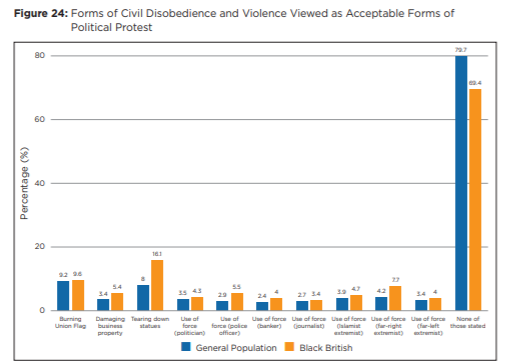
Here is the author's own take on this new attitudes research, noting the scale of challenge of dissatisfaction with institutions, and emphasising his own priority on family support & stability as a foundational issue.
https://twitter.com/rakibehsan/status/1364557686713569280
I think I have some proof points (from comparing my 2018, Autumn 2020 & Feb 2021 research findings) that these Black British perceptions are *not* the result of a shift in perceptions during 2020, though that may have some impacts at the margin
https://twitter.com/sundersays/status/1364682281361760261
It is a good thing to have this data, in which many different voices could find different narratives
- NB: the academy should be thinking about its general gap on minority attitudes & the specific absence of large-scale studies of Black British attitudes since the 2010 EMBES
- NB: the academy should be thinking about its general gap on minority attitudes & the specific absence of large-scale studies of Black British attitudes since the 2010 EMBES
I haven't yet heard of big moves in academia but it may be happening. (I see shifts on Black British history as part of our history now). British public attitudes are a enormous strength; race & minority attitudes since 2010 are such a big enormous gap, under-prioritised for £
Some progress in polling - albeit incremental & not yet committing to ethnic breaks as a 2020s norm.
@MattSingh_ of @NCPoliticsUK has advanced this agenda, including running 2 major Oct 2020 & Feb 2021 polls with 1000-bme + 2000-bme samples for me, which I wlll publish soon-ish
@MattSingh_ of @NCPoliticsUK has advanced this agenda, including running 2 major Oct 2020 & Feb 2021 polls with 1000-bme + 2000-bme samples for me, which I wlll publish soon-ish
Nb, the reparations finding is about a proposal that benefits UK minorities rather than developing countries. That is not the usual debate about reparations.
https://twitter.com/rakibehsan/status/1364701458902487053?s=19
The Times decided the opposition to violent protest was the topline here, so perhaps this was news, to either the news-desk or the readership after all
https://twitter.com/HJS_Org/status/1364635912542572548?s=19
• • •
Missing some Tweet in this thread? You can try to
force a refresh

